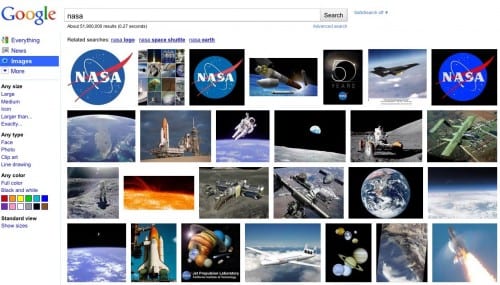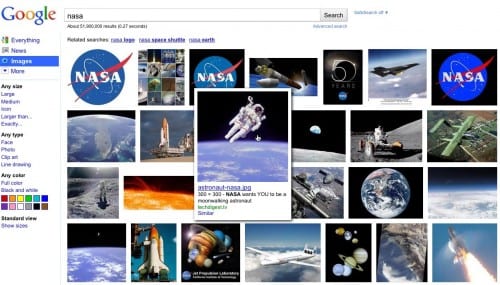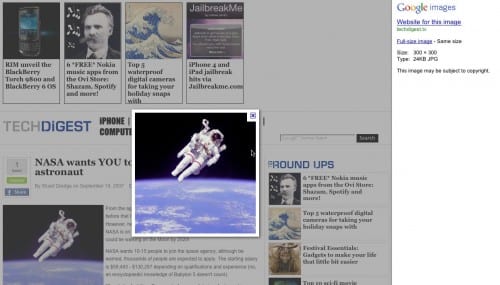Google Updates Image Search, Angers Webmasters

Recently Google announced an update to its Google Image Search product to improve its UI and make it more useful.
However, the UI seems to have been greeted with mixed reviews. In addition to some noting the similarities between the new search and Bing’s offering, the response to it has been split with some users hating it and others loving it.
Webmasters, however, have also been chiming in and their opinion seems much more negative. The reason is that, while all the changes were to the user interface, at least one of those changes has the potential to actually take audience attention away from the original sites.
It’s a problem that has a growing number of webmasters upset and, now that the new format appears to be here to stay, the chorus seems likely to grow.
The Changes
The most visible changes to Google Image Search are on the image search page itself. Gone is the “grid” layout and it is replaced with a more varied one that uses larger thumbnails with less whitespace. Gone are individual pages as it is replaced with a nearly-infinite scroll that will let the user go through 1,000 images at once.

One thing that has been removed is the image information, including dimensions and relevant text. Previously that was displayed below the image but now that information is only shown after the user hovers over the image itself, one point of contention among many who use the service.

Finally, clicking the image also now produces a different result. Rather than going to the original site loaded in a Google frame (with the Google portion on top), Google loads the site in a frame, with their panel to the right and adds a “lightbox” effect to the image, placing it over the original site and graying out the page.

It is this last change that has been the subject of most of the controversy among webmasters.
Not only does this add an extra click between the image result and the original site (forcing the user to click on the site if they want to see it), but it also loads the entire page in the user’s browser, using the site’s bandwidth, and keeps the ads from being clickable until the site is activated.
In short, many feel that Google is de-emphasizing the original site and, instead, putting even more focus on the image itself and their own search panel. This has the potential to hurt webmasters who earn revenue from advertising and see a lot of traffic from Google Image Search and that has some upset about the changes.
Time to Leave Google Image Search?
Previously webmasters, especially artists, have had something of a love/hate relationship with Google Image Search. Though it brought in some well-targeted traffic, many who did not know better used Google Image Search as if it were a stock photo library.
Google, for its part, hasn’t done a great deal to dispel this idea. It offers a vague warning that “This image may be subject to copyright”, a warning that is still present but has been moved to the right-hand side of the results page, and it did introduced a Creative Commons search that is very difficult to find for those who aren’t actively looking for it.
However, since Google Image Search as a good driver of traffic, many tolerated fact some users were abusing the search but it may be time to reevaluate that. The reason is that the quality of traffic from Google Image Search is almost certainly going to decline as sites are hidden behind the image, grayed out and are unclickable until activated.
Many, are going to wonder if Google Image Search is worth participating in and, since you can remove your site from Google Image Search without removing it from the main index, now may be the time to do just that.
Bottom Line
In the end, this is a choice up to the individual webmaster. Personally, I won’t be taking this step at this time. The reason is that I don’t see a great deal of traffic from Google Image Search now and most of the images on this site are logo and screenshots. If I were an artist or photographer where my images were more valuable, I would have to reconsider but, then again, I would also be more dependent on Google Image Search for traffic.
So I ask you the questions. What do you think about the new changes? If you are unhappy with them, do you plan on removing your site from Google Image Search?
All in all, there are no easy answers to this one but I can definitely see why many webmasters are upset.
Want to Reuse or Republish this Content?
If you want to feature this article in your site, classroom or elsewhere, just let us know! We usually grant permission within 24 hours.
